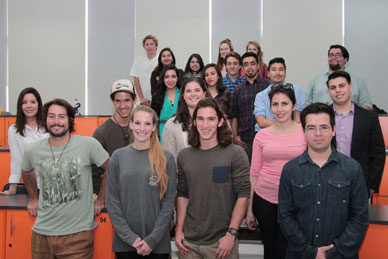The agreement signed by the Department of Linguistics and Literature of the Faculty of Humanities and the Department of Hispanic Studies of the oldest public university in South Carolina (USA), allows American students to take literature courses at Universidad de Santiago, promoting cultural exchange.
For the Associate Provost for International Education of the College of Charleston, Andrew Sobiesuo, this agreement “Offers very good opportunities for American students to know the Chilean and Latin American cultures and build links between both institutions.”
For her part, the Head of the Department of Linguistics and Literature, Dr Roxana Orrego, recognized the value of this initiative and she expects “The agreement to last for a long time to allow youngsters to enter into friendly relationships and strengthen language development, English and Spanish, in this case.”
On September 29th, nine students of the College of Charleston (South Carolina, USA) had a friendly colloquy with students at the English Language Education program of Universidad de Santiago.
The activity was held at the Citecamp building in the context of the agreement signed by the Department of Linguistics and Literature of the Faculty of Humanities and the Department of Hispanic Studies of the oldest public university in South Carolina, (USA).
This agreement was signed at the beginning of this year and it allows students of that American institution to take literature courses at Universidad de Santiago and to participate in different activities to promote cultural exchange.
During the activity, Dr Roxana Orrego, Head of the Department of Linguistics and Literature, recognized the value of starting this unprecedented agreement with a university which is renowned for its high academic level.
“We are pleased to start a program that we had been planning for two years and we expect to be well evaluated by the foreign students, so that this program becomes stronger, lasts for a long time and allows youngsters to enter into friendly relationships and strengthen language development, English and Spanish, in this case,” Dr Orrego said.
Earlier this year, during his visit to Universidad de Santiago, Andrew Sobiesuo, Associate Provost for International Education of the College of Charleston, showed himself “very optimistic” about the agreement and he said that it “Offers very good opportunities for American students to know the Chilean and Latin American cultures and build links between both institutions.”
More than language practice
During the colloquy, Professor Manuel Santibáñez, Head of the English Language Education program, also valued this inter-institutional agreement and he said that its potential “Goes beyond just practicing a language.”
“It is a very positive opportunity for our students to understand others and understand their culture, especially for those who still have not had the chance of travelling abroad,” professor Santibáñez said.
According to him, the opportunity of meeting with foreign students “Will allow our students to generate connections that will go beyond this activity.”
“For our students, realizing that they can perfectly communicate in other language is very motivating. This will help them to lose the fear of applying for scholarships and travel to other countries, something that all foreign language teachers should do,” he said.
Students’ opinions
Vincent Abbate (23) is one of the nine American students at Universidad de Santiago who participated in the colloquy.
“I have really enjoyed the experience of knowing Chile and this university. I have been able to practice mi Spanish, learn new words every day and meet very nice people, Abbate said. He added that now he is trying to see other places in the country and to learn local expressions.
For her part, Daniela Olivares, a fifth-year student at the English Language Education program of Universidad de Santiago, expressed her gratitude for “The opportunity to share with foreign youngsters and to strengthen our knowledge both of English and Spanish.”
“Although we have been studying for many years, this has been a very good opportunity for learning through practice. We have been able to learn new words, how people live abroad and what are these students’ experiences in Chile,” she said.
Translated by Marcela Contreras



